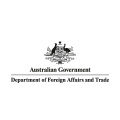Department of Foreign Affairs and Trade
Department of Foreign Affairs and Trade 2019 Graduate Program
Opportunity expired
Opportunity details
- Graduate Job
- $65,808
- Apply by 22 Mar 2018
Our two-year graduate program will kick-start your career in the Department of Foreign Affairs and Trade (DFAT), whether focusing on policy or corporate management roles. During the course of the program, you will undertake a tailored learning package delivered through DFAT's Diplomatic Academy. You will develop a broad knowledge and understanding of the Government's foreign, trade and aid policy priorities and the department's financial and corporate context and service delivery to Australians overseas through our consular and passports services. You will also complete work placements, giving you first-hand experience of the department's diverse range of priorities, including:
- bilateral economic and political relations
- international trade negotiations, investment and economic analysis
- humanitarian assistance
- development and aid program management
- international security
- public diplomacy
- commercial, administrative and international law
- multilateral and global issues
- financial, human and asset management, including security and property
- project management
- consular and passport services.
The aim of the Graduate Training Program is to equip graduates with the insight and skills to make a real contribution to many aspects of international life. The training program includes a two-week induction, a one week mid-term block of policy and tradecraft course and a six week International Graduate Program (IGP), where we invite junior diplomats from other countries to participate. The IGP is designed to give participants both an academic and a practical overview of subjects such as Australian Culture & Values, Development Policy & Practice, Diplomatic Tradecraft, Economic Literacy for Non-Economists, International Law, International Policy & Tradecraft, Presentation Skills, Promoting & Protecting Human Rights, and Trade Policy & Negotiations as well as diplomacy-focused professional skills training and a business travel program undertaken in other states and territories.
After you have completed the program, you will have an ongoing APS Level 4 position in Canberra. You will also be eligible to apply for positions in one of our overseas posts, although it can be a few years before graduates take up overseas positions.
About the employer

Department of Foreign Affairs and Trade AU
3.8
1,000 - 50,000 employees
Government & Public Service
Our two-year graduate programs will kick start your career in the Department of Foreign Affairs and Trade (DFAT). In 2020, DFAT will offer two graduate programs based in Canberra: policy and management.
Pros and cons of working at Department of Foreign Affairs and Trade AU
Pros
Interesting subject matter and travel opportunities.
The small numbers of people working on big issues
Good culture, unmatched conditions in terms of work opportunities overseas
Opportunities to travel, diverse range of work, interesting insights into foreign policy
Working with excellent and inspirational people, working on a very interesting subject matter that is highly relevant to high-profile national and international issues.
Cons
Hierarchical, micromanagement, slow promotion, no posting opportunities, no language opportunities
Extremely hierarchical, very slow progression, areas protective of "good work", low levels of trust of graduates, too little work/responsibility allocated, hypercompetitive
Bureaucratic, organisation has limited engagement with or assistance for officers re achieving career goals, patronage
Work can be slow, travel and posting opportunities are diminishing by the year, opportunities for autonomy and innovation in work are minimal, work is largely reactive not strategic, most work is process-based, chronically under-resourced.
High degree of uncertainty about postings and career progression